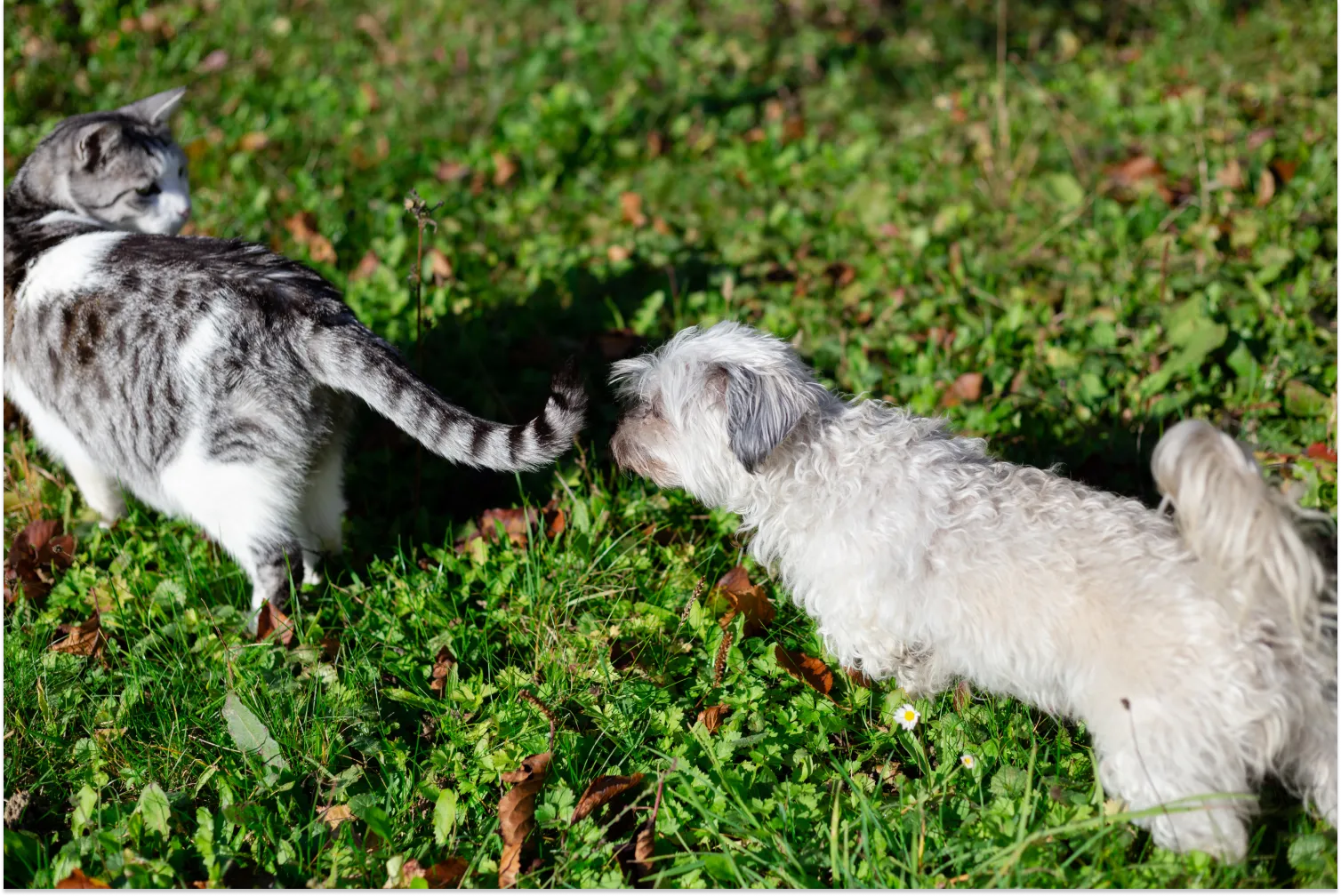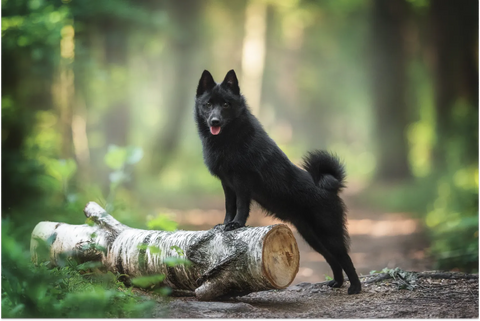
Why Do Dogs Eat Cat Poop?
Imagine a sunny afternoon, the birds chirping, when suddenly, you notice your beloved canine companion indulging in a rather unexpected behavior — eating cat poop! Your initial reaction might be one of disbelief, perhaps followed by concern. After all, why would our dogs, especially those spoiled with the finest of doggie dishes, show interest in cat feces?
Unbeknownst to many, this behavior, while certainly eyebrow-raising, stems from canine history and biology. As pet parents who are serious about understanding and ensuring the health of our furry family members, it's essential to delve deeper into this quirky behavior.
The Natural Canine Instinct
The image of our domesticated dogs comfortably lounging on our couches is worlds apart from their wild ancestors who roamed the lands, scavenging for sustenance. Historically, dogs have been opportunistic eaters.
In the wild, food sources were not guaranteed. To ensure survival, they often consumed whatever they found, even if it wasn't the most appetizing by our standards. This scavenger behavior included eating feces, which, while unpleasant to think about, provided some semblance of nutrition in desperate times.
Our dogs' wild ancestors didn't have the luxury of being choosy. When food was scarce, it was vital to extract every ounce of nutrition from whatever was available.
Over time, this instinctual behavior was ingrained in their DNA, making them more predisposed to occasionally snack on the “leftovers” they came across. While our modern pups are far removed from such survival situations, some primitive instincts remain.
What Causes the Attraction to Cat Poop?
With their carnivorous diets, cats have a nutritional makeup that's quite different from our canine friends. Their food often consists of higher protein and fat levels.
As a result, their feces can retain a significant amount of these nutrients. For a dog, that might be enticing. In simpler terms, what gets passed through a cat's digestive system can still be of “value” to a dog.
Imagine preparing a wholesome, delicious meal, rich in flavors and nutrition, for your dog. Now, in comparison, while cat poop is nowhere near that gourmet experience, it might still give off an aroma or taste that intrigues our pups. Their discerning noses and ancient instincts can detect the nutritional remnants in the cat feces, making it oddly tempting.
Furthermore, bone broth in some cat foods can amplify this allure. The rich, savory smell of bone broth is hard to resist for many dogs. And if a cat's diet features this component, it's no wonder our dogs may show some interest in their leftovers.
What Is Coprophagia in Dogs?
When we observe our dogs snacking on feces, whether from cats, other dogs, or even themselves, the behavior is termed "coprophagia." While it sounds like a rather scientific and intimidating word, at its core, coprophagia simply denotes the act of eating feces. It’s a behavior observed not just in domesticated pets but in the wild, too.
It's important to differentiate between occasional feces consumption and an obsessive pattern. An isolated incident, while unpleasant for pet owners, might just be an expression of that inherent scavenger instinct.
However, if your dog routinely seeks out and consumes feces, it might indicate underlying dietary deficiencies, health issues, or behavioral challenges. Like humans, dogs are individuals, each with their quirks and behaviors, but consistent coprophagia warrants a closer look.
What Are the Health Risks for Dogs?
While our canine friends occasionally indulge in odd behaviors, understanding the implications is essential. Consuming cat feces is more than just an eyebrow-raising habit. It comes with potential health risks that every pet owner should be aware of.
Let's delve into the potential dangers this behavior may pose to our furry companions.
Beyond the evident unease we might feel observing this behavior, tangible health concerns are associated with coprophagia. As meticulous and clean as they are, cats can still harbor parasites and bacteria in their feces.
When dogs consume these feces, they risk ingesting harmful pathogens, which can lead to digestive problems, infections, and more. Moreover, if the fecal matter has been in contact with cat litter, there's an added layer of concern.
Many commercial litters, especially those that clump, can cause digestive blockages if ingested. These blockages can lead to severe health complications, ranging from gastrointestinal distress to the need for surgical intervention.
Furthermore, cats might consume foods or medications that are toxic to dogs. Even if these elements pass harmlessly through a cat's system, remnants in their feces can still be harmful when ingested by dogs.
Lastly, while A Pup Above is passionate about flavor and nutrition, we're equally serious about pet health. Consuming cat feces can introduce foreign substances and toxins that could upset a dog's balanced diet or lead to allergic reactions. By understanding these risks, we can better protect our pets and ensure they stay in peak health.
How To Discourage the Behavior
Navigating the quirks of our beloved canine companions requires a blend of understanding, patience, and actionable steps. When it comes to coprophagia, many pet parents naturally seek ways to discourage what can seem like an unsavory habit. In this section, we'll explore effective strategies that address the behavior and do so with your pet's overall well-being in mind.
- Dietary Adjustments: Start by ensuring your dog's diet is nutritionally balanced. Sometimes, a deficiency can spark an increased interest in feces. You can help satisfy their nutritional cravings by offering high-quality, flavorful meals.
- Training and Positive Reinforcements: Redirect their attention. If you catch your dog in the act or even showing interest in the litter box, divert them with toys or treats. Reward them when they resist the temptation, reinforcing positive behavior.
- Cleanliness: One of the most straightforward measures is regular cleaning of the cat's litter box. A clean environment reduces the opportunity for dogs to indulge in this behavior.
- Check for Underlying Health Issues:Regular vet check-ups can help identify if there's a health or dietary reason behind the behavior, allowing for timely intervention.
Wrapping Up: Navigating Canine Quirks for a Healthier, Happier Pup
With their boundless energy, love, and occasional quirks, dogs are a source of endless joy and occasional puzzlement for pet owners. Understanding behaviors like coprophagia helps us care for them more effectively and deepen our bond.
While our canine companions might sometimes make choices that baffle or concern us, it's always rooted in instinct, health, or behavior. With patience, knowledge, and the right tools, we can navigate these challenges, ensuring our pets a happy, healthy life.
And always remember, while our dogs might not always make gourmet choices outdoors, with meals like those from A Pup Above, they can always have a gourmet experience at mealtime.
Sources:
How Wolf Became Dog - Scientific American
The paradox of canine conspecific coprophagy - National Library of Medicine
Dogs | Healthy Pets, Healthy People | CDC
How To Clean a Litter Box: Tips for a Fresher Home and a Happier Cat | TIME Stamped
Top Stories

Why Do Dogs Lick Their Paws?

Why Do Dogs Whimper & Make Noises in Their Sleep?

Healthy Vet-Approved Homemade Dog Food Recipes

How To Cook Sweet Potatoes for Dogs






















